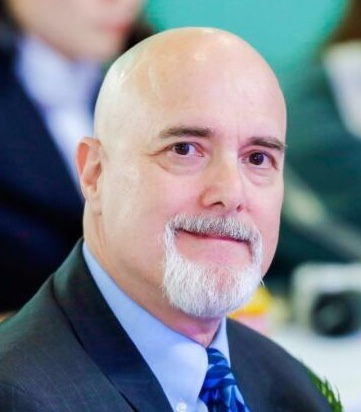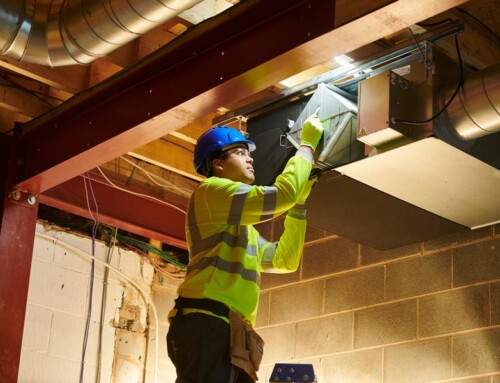How to Green Your Trip to ISSA Show North America
More than 12,000 people from around the globe will soon descend on Las Vegas for ISSA Show North America. The event will be filled with great educational sessions, meetings between vendors and buyers, introductions of exciting new products and programs, parties, and just plain fun.
However, with an event this big, we also have a large environmental footprint, and this article is designed to provide some easy and fun tips for us to tread more lightly. The following are 16 greening tips broken into four categories:
- At the hotel
- At parties, restaurants, and bars
- At the convention center
- While traveling
Greening your hotel stay
Heating, adjusting thermostats, and opening the blinds. The temperature in Las Vegas in mid-November typically ranges from the mid- to high-60s F during the day and drops into the mid-50s F during the evening. When leaving your hotel room, turn the thermostat down to conserve energy and open the blinds to let the sun help warm the room. It will only take about 15 minutes upon returning to get the room to a comfortable sleeping temperature, and there is no need to waste energy while the room is unoccupied.
Room electricity use. Upon leaving the room, take a few seconds to make sure all devices using electricity are turned off. This includes lights, televisions, radios, laptop computers, battery chargers, and other devices that consume electricity. This simple step will help reduce unnecessary electricity waste.
Water and energy savings with towels and linens. Hotels use approximately 25 gallons of water per day, per room, for laundry operations, along with a significant amount of energy to heat the water and dry towels and linens. Water use is a big issue in Las Vegas. Thus, reusing towels and linens reduces both water and energy use. Indeed, if the items are dirty, get them laundered. However, in most cases, they do not need to be laundered daily. Hang them on towel racks, because if you leave them on the floor or in the bathtub, they’ll automatically get washed.
Other water‑saving tips. If a faucet drips just one drop every second, it can waste about five gallons of water each day. While this may not sound like a lot, with 16,000+ convention attendees occupying thousands of rooms, it can quickly add up. Make sure to turn off the faucets, showers, and bathtubs. If the problem requires a plumber to make repairs, take a moment to call the front desk and let them know. The sooner they fix it, the less water will be wasted.
Greening your eating and drinking
Eat and drink locally. Las Vegas is a great food town. When going out to eat and drink, consider a locally owned establishment where the profits are more likely to help the local community. Check out the menus for local options for meats and produce, as well as beers, liquors, and other beverages. Supporting local businesses is beneficial for our communities, and it can be a fun and rewarding experience.
Make wise meat choices. Raising cows requires at least ten times more resources than raising chickens, dairy, or pork. Chicken, dairy, and poultry are relatively similar in their environmental burden, according to a study published in the Proceedings of the National Academy of Sciences. Beef requires 28 times more land, six times more fertilizer, and 11 times more water compared to those other food sources, and produces up to about five times more greenhouse gas emissions. So enjoy your meal, but understand that your menu selection really does make a difference.
Eat healthy. It’s party time in Las Vegas, but don’t forget to eat your veggies and skip the fried foods for healthier preparations. You may find that you really enjoy other options, and there are plenty of them in Las Vegas. And if you have never tried one of the new meatless options (e.g., Beyond Meat or the Impossible Burger), give it a try. You’ll be pleasantly surprised by how indistinguishable they are from beef, with a much lower environmental footprint. Plus, our farmers appreciate it.
Don’t waste food. Some estimate that as much as 40% of the food produced in the U.S. is wasted, representing approximately 133 billion pounds and $161 billion worth of food. While this includes losses on the farm, in processing, packaging, and transportation—and at the table—a significant portion of it (and importantly, the portion we can control) is what we take and don’t eat. Enjoy the dinners and parties, but be conscientious about what you take. Hopefully the restaurants and hotels are donating untouched food to food pantries.
A more sustainable convention
Electronic marketing materials. Some estimates suggest that as much as two-thirds of marketing materials given out at trade shows are simply thrown away. These materials have significant environmental impacts due to the paper on which they are printed, even if it is sustainably harvested and produced using environmentally friendly printing processes. So rather than distributing paper brochures, have exhibitors email the information.
Refillable water bottles. Refillable water bottles are a must at trade shows. In the U.S., every second, more than 1,500 plastic bottles are discarded, with most ending up in landfills. It is estimated that manufacturing all of these plastic bottles requires more than 900 million gallons of oil annually. Plus, bringing your own refillable bottle will save you money, as water, sodas, and other drinks can be expensive on the trade show floor.
Reusable serviceware. When given the choice between washable and reusable plates, cups, forks, and other items versus disposable alternatives, opt for the reusable option. While washing these items consumes water, energy, and chemicals, it is still much less compared to the environmental impacts associated with manufacturing disposable or even compostable options.
Ask exhibitors about their efforts to become more sustainable. Many companies in the cleaning industry are doing great things in terms of sustainability, so ask them about it. And if you are an exhibitor, be prepared to talk about what your company is doing. The mere act of discussing sustainability sends a clear message that the cleaning industry cares and, more importantly, is making significant strides toward reducing unnecessary waste and becoming a more sustainable industry.
Transportation while in Las Vegas
Walk. Especially if your hotel is conveniently located near the Mandalay Bay Convention Center. Not only is it better for your health and the environment, but it will also eliminate waiting in lines for buses, cabs, and Ubers, and save you money.
Bus. Take the convention buses that run every 15 or 20 minutes. There’s no need to deal with Las Vegas traffic or parking when the buses are so convenient—and they are free! Plus, consider sitting with someone you’ve never met before. It could be the beginning of a great relationship.
Ridesharing. Whether driving your own vehicle or taking a ride with Uber, Lyft, etc., consider sharing the ride with others. If you were already prepared to pay for the ride, adding another passenger won’t add any more cost. Additionally, it distributes the environmental impacts evenly among all passengers. And this unexpected act of kindness will surely put a smile on someone’s face.
Carbon offsets. For those who want to minimize or completely offset the carbon associated with travel and hotel stays, consider purchasing carbon offsets, which are offered by many airlines and travel sites. The money typically goes towards planting trees or other habitat restoration projects, and new offsets are being developed to support local projects that offer a component of social justice, in addition to environmental benefits.
Finally, when you leave your hotel, please consider leaving a gratuity for the housekeeping staff along with a note thanking them for keeping the room clean and healthy. After all, we represent the best of the cleaning industry, and if we aren’t willing to support them, who will? Together, we really can make a difference.
“Why Going Green Matters at Your Next Tradeshow,” by Shane Shirley, Tradeshow News Network, March 6, 2014
“Raising Beef Uses Ten Times More Resources Than Poultry, Dairy, Eggs or Pork,” by Rachel Nuwer, Smithsonian.com, July 21, 2014

















